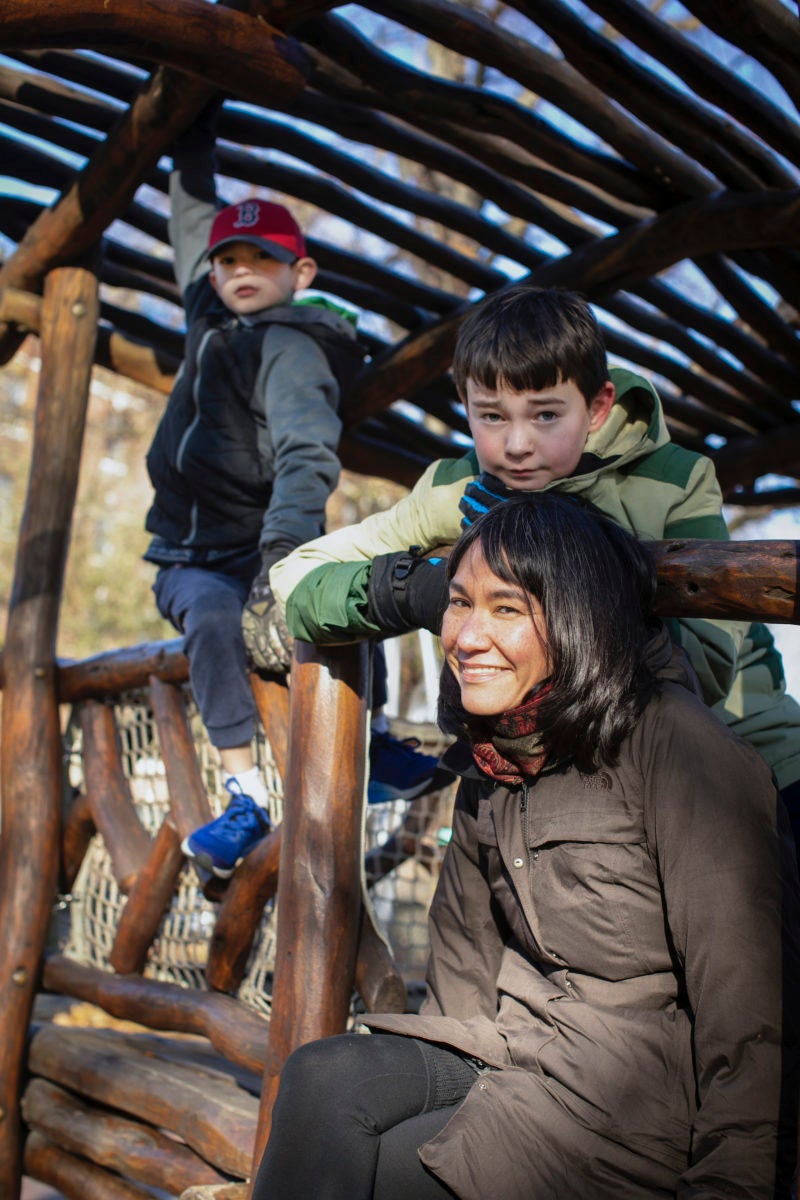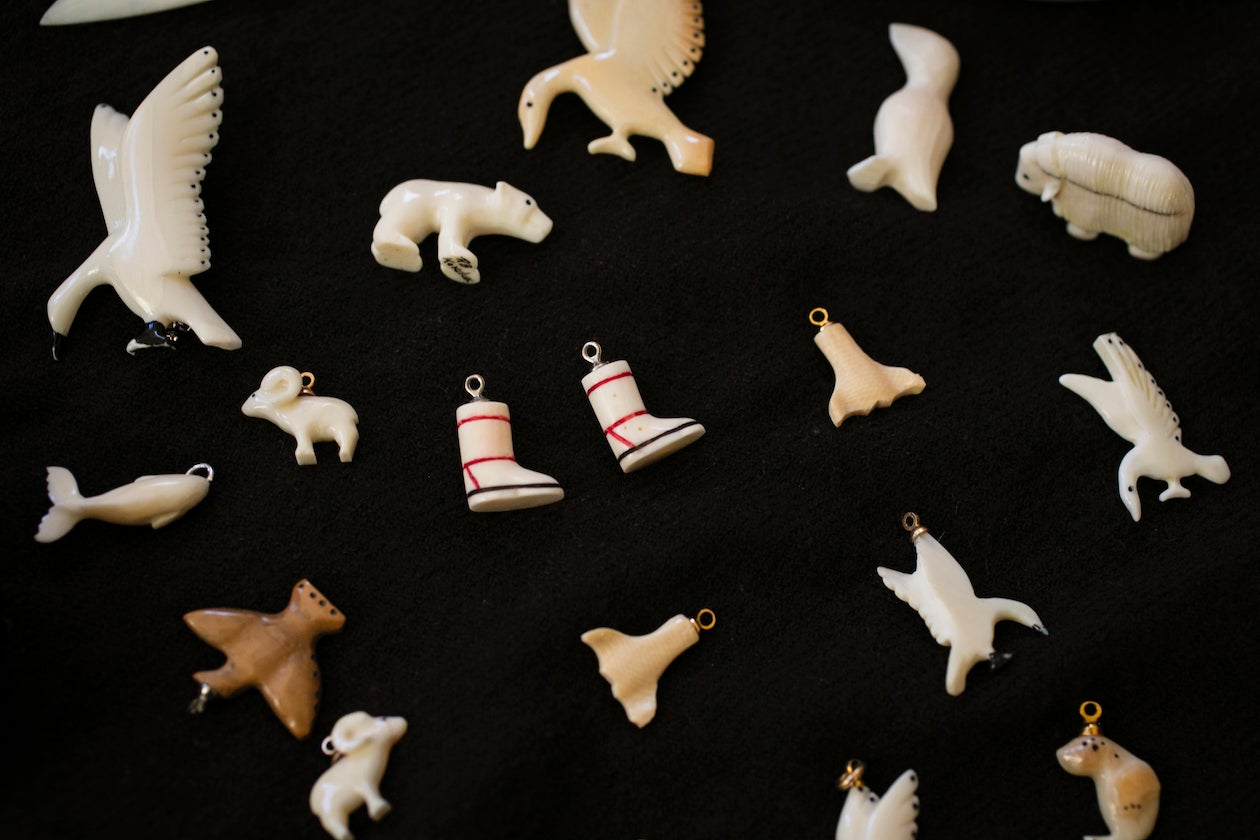Video by Justin Saglio/Harvard Staff
Speak, memory
“Being attentive to loss doesn’t have to be devastating.”
Alaskan poet Joan Naviyuk Kane, A.B. ’00, is fiercely dedicated to sustaining her Alaska Native language, a devotion she learned from her grandmother, who as a young woman had to dig in her heels and defend its importance against an increasingly hostile English-speaking society.
Kane relates to her grandmother’s tough times and challenges. No corner of the world was remote enough to escape the horrific flu pandemic of 1918. For Kane’s grandmother and her sisters, the death of their parents at that time meant traveling on foot from Mary’s Igloo, Alaska, their remote Inupiaq reindeer hunting camp on the Seward Peninsula, to a Catholic mission 20 miles away.
“I think they were 2, 4, and 6 when my grandmother and her older sister switched off carrying their younger sister along the Pilgrim and Kuzitrin Rivers,” said Kane. “They thought that the way to survive was to get to where there might still be people living, and they knew there was a church or mission at this hot-springs location.”


(Image 1) Alaskan Native poet Joan Naviyuk Kane is teaching her two sons, John and George, the Qawiaraq dialect of the Inupiaq language. (Image 2) Walrus and mastodon carvings from the Kane family. Ivory carving is a discipline handed down through generations of men in Kane’s family. It is her hope that her two sons will be able to learn, but climate change has drastically affected the population of walrus, a traditional source of ivory for the Inupiaq.
Stephanie Mitchell/Harvard Staff Photographer
The orphaned sisters were raised by the mission’s Ursuline nuns, who taught them English, French, and Latin. But through that process, they and other Alaskan Native survivors of the pandemic remained dedicated to speaking their first language, the Qawiaraq dialect of Inupiaq.
“This is at a time when many Native people were physically beaten, even in American schools … for speaking anything other than English,” said Kane. But “through this experience of having learned a number of languages, she was able to instill in King Islanders of my mother’s generation a real pride in the [Inupiaq] language,” said Kane. “She insisted that King Islanders keep our language alive, and … use it … to connect with others.” That care and attention to culture and language carried through the following generations of Kane’s family, down to her own children.
Kane returned to her alma mater this fall as a Hilles Bush Fellow at the Radcliffe Institute for Advanced Study, and while back in Cambridge she is expanding her written work beyond poetry in a collection of essays exploring themes of indigeneity, gender, and motherhood.
Kane believes that exposing people to written Inupiaq is essential to the language’s depth and influence. Her poems are written in both Inupiaq and English, and her family owns the only known written dictionaries of the dialect, which her older son is working to digitize so they can be shared within their community and far beyond.
Joan Naviyuk Kane reads her poem “Ilu”
transcript
Transcript:
This poem is called “Ilu”
Uluaq, ukak, niaquŋ—
Inukguruŋa.
Panik aakaa
Avvak.
Uyaġauramik.
Maatnami imma pitaiqutuq.
Kurgit, nuġi, tagiuq—
Akkuni,
Atniqtuŋa.
Nalurusi.
Aakaa puuyanatuŋa.
[Translation]
Cheek, tongue, headache—
I am a human being.
Daughter mother
Asunder.
A shard of rock.
Now what was is no more.
Rivers, wind, salt—
A while ago
I got hurt.
You were all unaware.
Mother I forgot.
“King Island Inupiaq is predominantly a spoken language, and I have found as I’ve developed in my career as a writer and as a teacher that I really have a responsibility to use the language as a written language,” said Kane. “Because there are so few in-person speakers of the dialect alive, the written language can extend and reach far more people than our spoken language can.”
Today, there are between 100 and 150 primary speakers of Inupiaq remaining, a number that Kane hopes will grow through carrying on and spreading her grandmother’s practice of teaching the language.
“When [a] language is lost, when a word … is no longer spoken or invoked or used or remembered, in some ways that is irrecoverable,” said Kane. “That said, there are so many ways to reconstruct what’s lost, and I think being attentive to loss doesn’t have to be devastating. It can really inform people to take action and to participate — not just keep [something] alive, but actually think about the capacity of the human imagination … to create something new.”
This story is part of the To Serve Better series, exploring connections between Harvard and neighborhoods across the United States.




